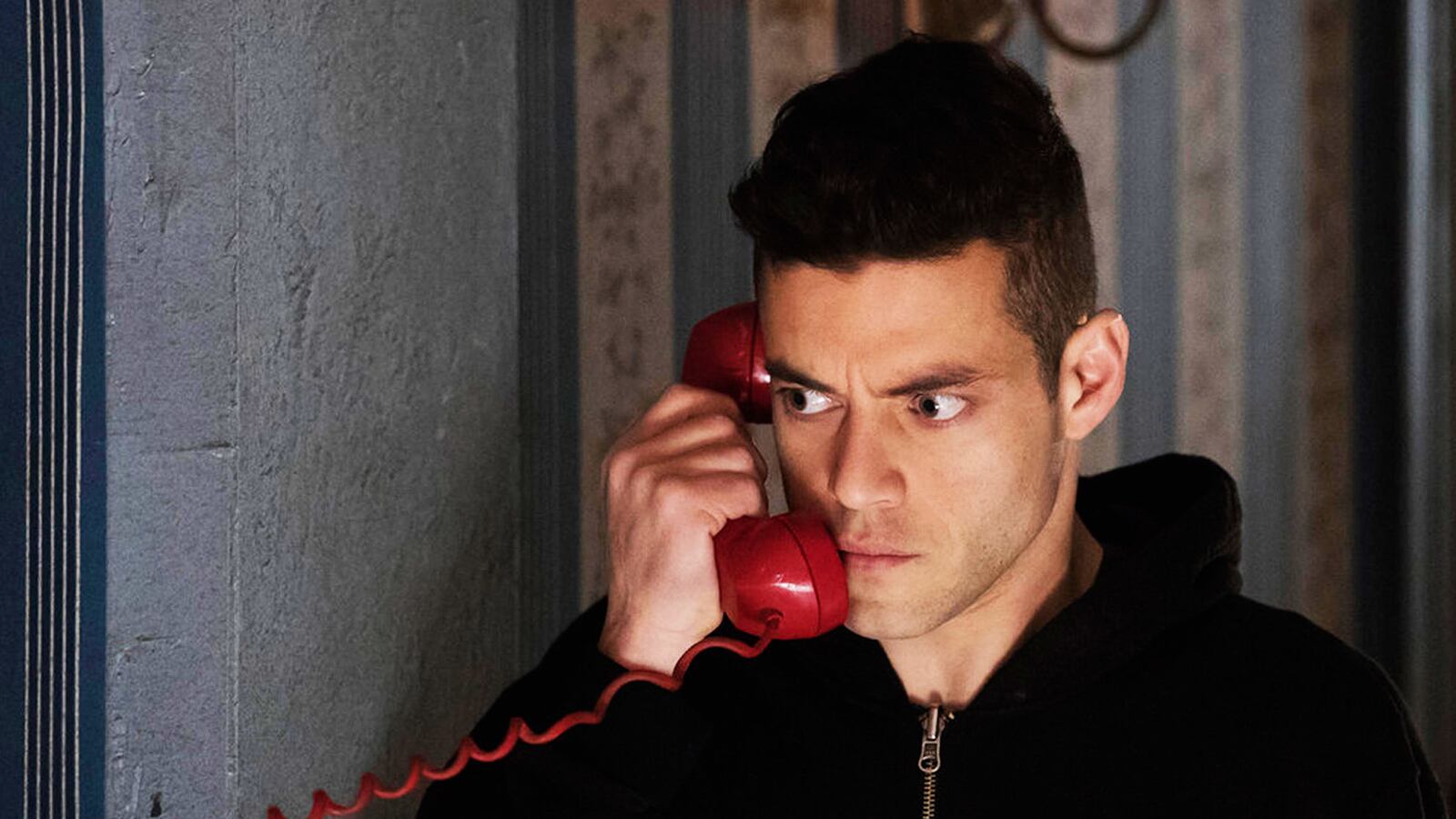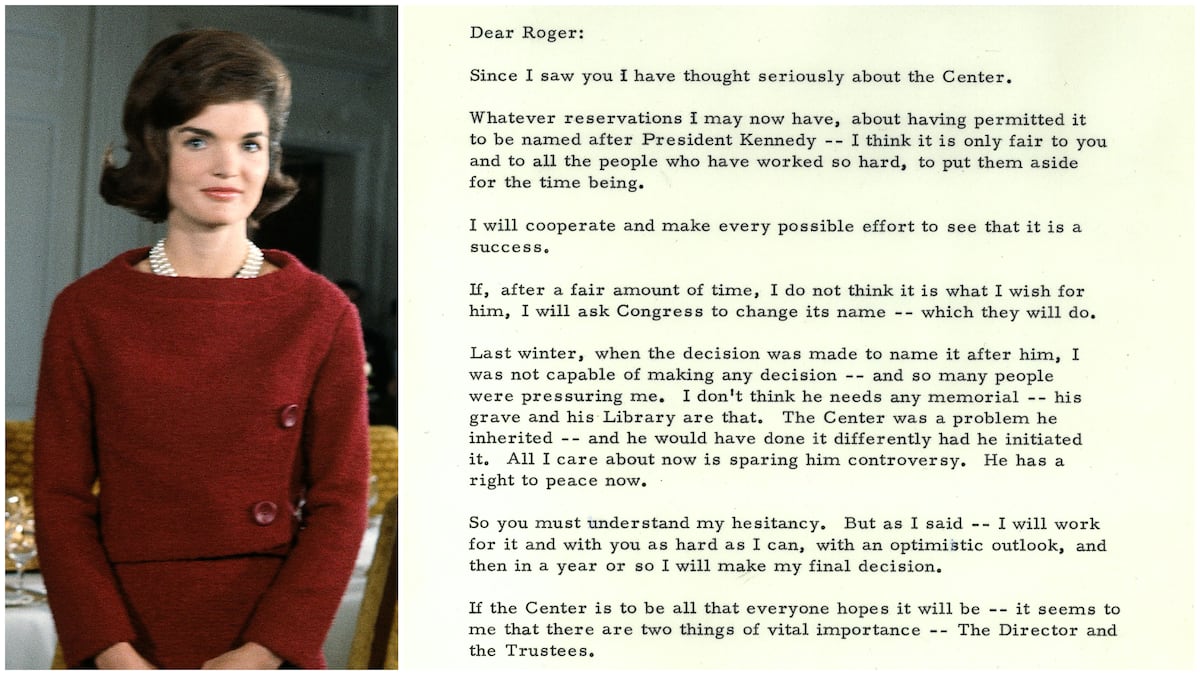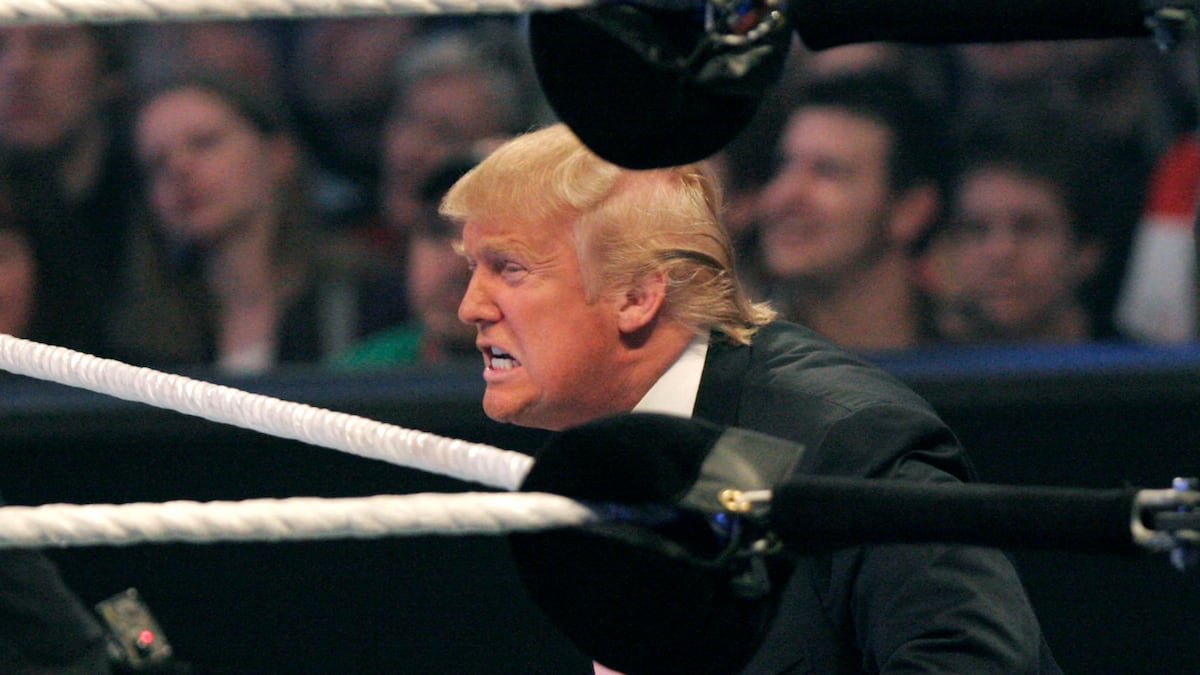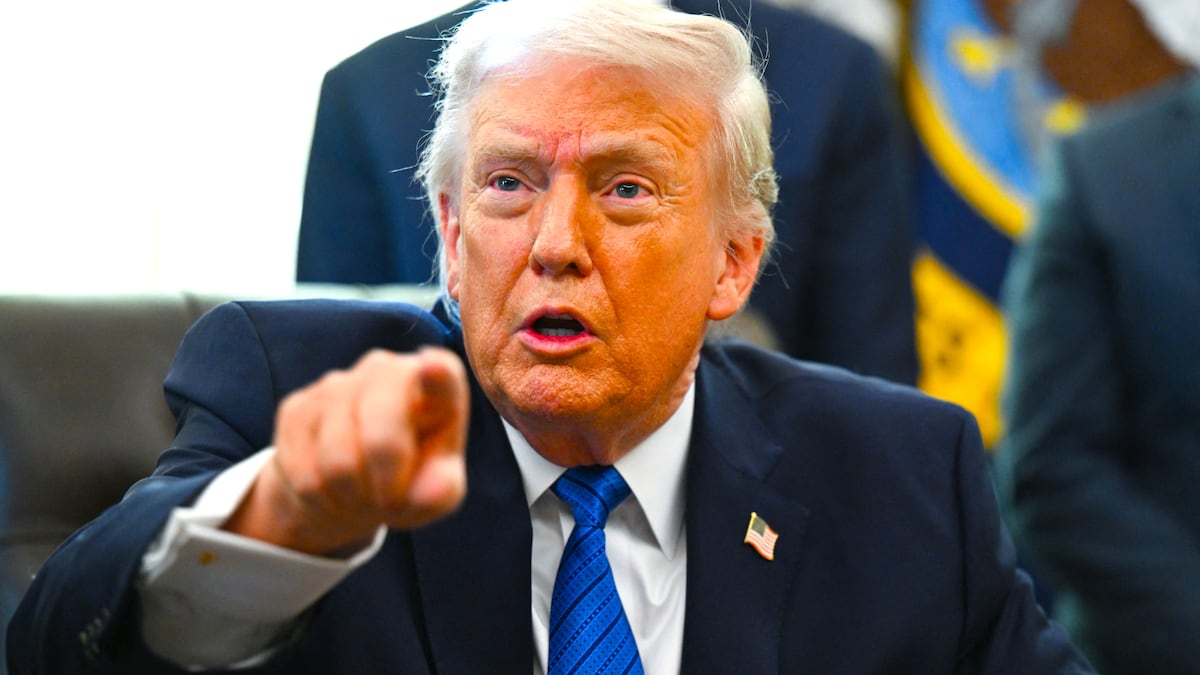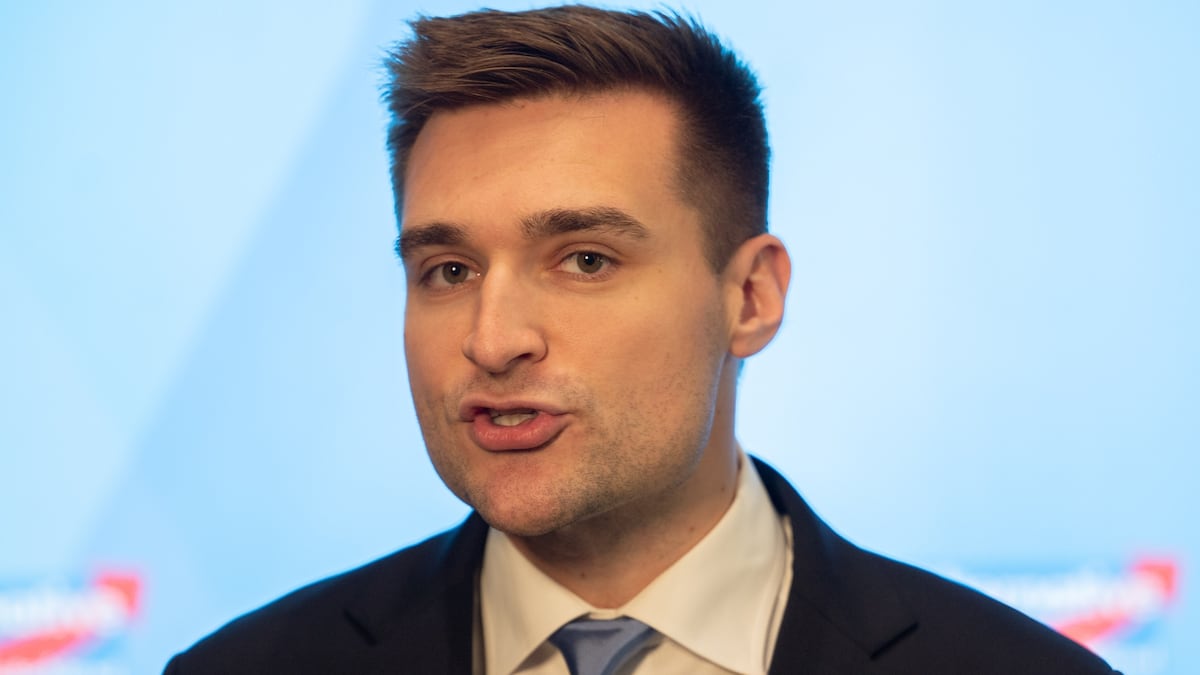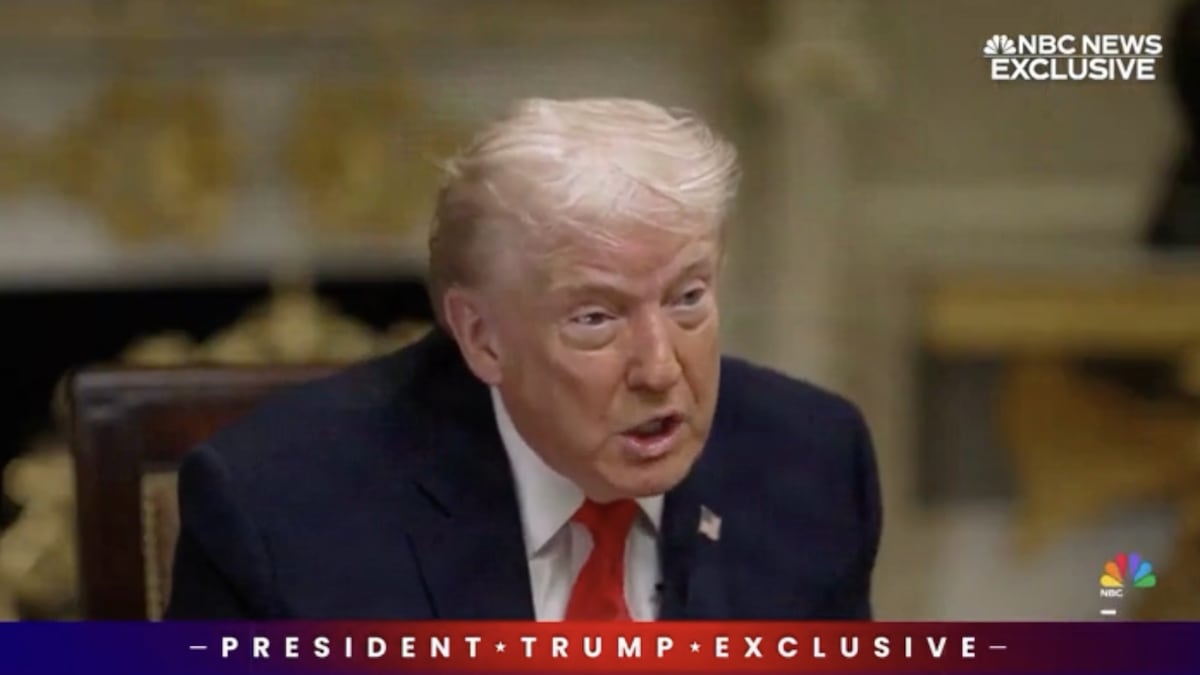“Do you have the time?”
Time, Mr. Robot viewers know, is always running out, like water in a cracked fish tank. It’s a preciously limited resource that Whiterose (BD Wong), the leader of the Dark Army, allows to pass her by only in five-minute increments.
Still, those of us not driven totally insane by this season’s stubbornly opaque plotting have kept coming back, offering more of our time to decoding what “Stage Two” is all about, how much of what we see is real, whether Tyrell (Martin Wollstrom) is dead or alive, and what the fuck Back to the Future Part II has to do with anything.
It’s been a rough, if thrilling struggle. Keeping up with series creator Sam Esmail’s bottomless layers of pop culture references, densely packed visual and audio clues, and deliberately incoherent story threads has been like solving a puzzle, blindfolded, with gnawed-off pieces from three different sets after a third of them have gone missing—if they were ever there at all.
But just like the cat poster told us to, we kept hanging in there. Now we’ve reached the end. We’re winded, and still confused. But we’re also exhilarated. As a capper for one of the most unruly, willfully inscrutable TV seasons in recent memory (don’t worry, Lost still wears the crown), this finale was audacious and sometimes brilliant. It answered some questions, posed many more, and even went so far as to undercut many of its own enigmas with shockingly mundane reality checks.
That is, until those last five words: “Do you have the time?”
In a tantalizing, all-too-brief post-credits scene set to Bob Seger’s “We’ve Got Tonight,” one of the season’s lingering mysteries is finally solved: We learn that missing fsociety hackers Trenton and Mobley are alive, well, working at a Fry’s electronic store, and uncovering a risky way to solve fsociety’s dilemma. If you haven’t yet, watch the scene below.
In the scene, Trenton tries getting Mobley to reconsider looking at something “important” she’s recently discovered, something that “could potentially undo this whole thing, put everything back the way it was.” What she wants to fix, presumably, is their current situation: fsociety’s failed revolution, the deaths of friends like Romero, and the danger from FBI and Dark Army agents that drove them to leave their families behind in New York.
Trenton talks about “generating a key”—a phrase now instantly reminiscent of the mesmerizing, Lynchian scene between Angela (Portia Doubleday) and Whiterose last week, in which the latter spoke of doors to “unlimited imagination” and posited that the deaths of Angela’s mother and Elliot’s father happened for a reason. “It’s no coincidence that you and Mr. Alderson became who you are after what happened at the Washington Township plant,” she said, referring to a toxic waste coverup.
Whiterose regularly speaks this way, as if she thinks of timelines in their entirety, rather than one moment at a time. (She explicitly mentions alternate timelines in the fourth episode of this season, when she asks Dom what the world might look like had fsociety’s 5/9 hack never happened. “Some believe there are alternate timelines playing out that very scenario,” she said then. “That the lives we are leading are the people that we have become.”)
Then there’s the abrupt entrance of Elliot’s old prison mate, newly revealed Dark Army agent Leon, who asks, “Do you have the time?” His question, compounded with the litany of Back to the Future II references Esmail keeps dropping into the show, certainly makes it seem like time, or even time travel, is something the creator wants on our minds.
The rest of the questions this finale answered were ones we’ve feverishly tried to unravel all season, to no avail. Strangely, now in retrospect, so many of them seem insignificant, even irrelevant. In that way, this Mr. Robot episode has a lot to say about the nature of reality and imagination.
So we know who was really calling Joanna (Stephanie Corneliussen) and leaving presents at her doorstep. Big whoop. It was never Tyrell. And it wasn’t Elliot (Rami Malek) unwittingly posing as Tyrell in another manifestation of his split personality, as some viewers had suspected. It was just a miserable, lonely old widower intent on tormenting the woman his romantic rival left behind.
Darlene (Carly Chaikin), we learn, is just fine minus her bruised ego and broken heart. Her boyfriend Cisco (Michael Drayer) indeed was killed in the Dark Army’s attack on the Mexican restaurant, but you probably already guessed that. Dom (Grace Gummer), that sympathetic shark of an FBI agent, takes Darlene into custody and reveals how much she really knows about fsociety and their associates—which, of course, is everything.
As Dom casually informs Darlene, sturdy old Romero (Ron Cephas Jones) was no victim of a Dark Army hit job—a notion that had driven Darlene and her cohorts to hair-pulling, murderous paranoia. He was simply killed by bad luck. A stray bullet from a nearby shooting pierced him in his mother’s backyard on a bright afternoon, and that was that. “A freak accident.” Mystery solved.
And “Stage Two,” Mr. Robot’s master plan conceived with the Dark Army and Tyrell sometime during Elliot’s missing three days, is indeed as cataclysmic as we feared—it involves blowing up a skyscraper in the heart of New York to destroy the paper database E-Corp has slowly been rebuilding—but we never see the plan put into action. Elliot foils Tyrell, putting his own body between him and the trigger button. So much for that.
And Elliot, our unreliable narrator, decides he’s had enough. Convinced he’s outsmarted his own treacherous mind, he stands in front of a gun-wielding, teary-eyed Tyrell and boldly voices what skeptics in the audience are surely thinking: “He’s not holding a gun. He’s not even there.” Tyrell is dead, right? That’s what Mr. Robot (and Reddit forums) say. Elliot is imagining him, assuming his identity the way he assumed his dead father’s.
“He doesn’t exist,” Elliot says, convincing himself he’s the only one in the room, tears now welling in his own eyes. “I’m the only one that exists. It’s time to finally take back control.”
Elliot, we soon see, is dead wrong.
Like the mysteries of Romero’s death, Joanna’s caller, and Tyrell’s existence, real life often turns out to be disappointingly more mundane than what we imagine. A revolution to change the world for the better fizzles into an unwieldy, unsustainable delusion, easily absorbed and commodified by the powers that be (see: E Coin).
And a bold, heroic moment that cuts through the haze of paranoia, confusion, and pain can end in an undignified collapse to the floor. Tyrell was indeed real. And so was his gun. Real blood spills out of Elliot’s stomach as he gasps in confusion, falls to his knees, and looks up as Mr. Robot glitches and says, “Sorry, kiddo. Couldn’t let anyone stop this. Including us.”
Elliot, we presume, will be fine. Angela (now in cahoots with Whiterose after the latter let her in on a secret we have yet to hear) speaks to a sobbing Tyrell over the phone just before the city is plunged in darkness and says she should be the first to see Elliot “when he wakes up.”
Still, even when real life proves disappointingly mundane, it still finds a way to surprise you. Tyrell tells Angela he “loves” Elliot, speaking to a bond the two have shared via Mr. Robot that Elliot remains sadly unaware of. (If anyone could use a BFF right now, it’s Elliot.) Or hell, maybe real magic is on the horizon in the form of time travel.
For viewers at least, some of that magic is in the form of a show that refuses to be easy, that willingly frustrates us, that teases us to hang in there, yet still rewards us in the end. Mr. Robot will test our patience again when it returns in 2017, but we’ll be along for the ride.

